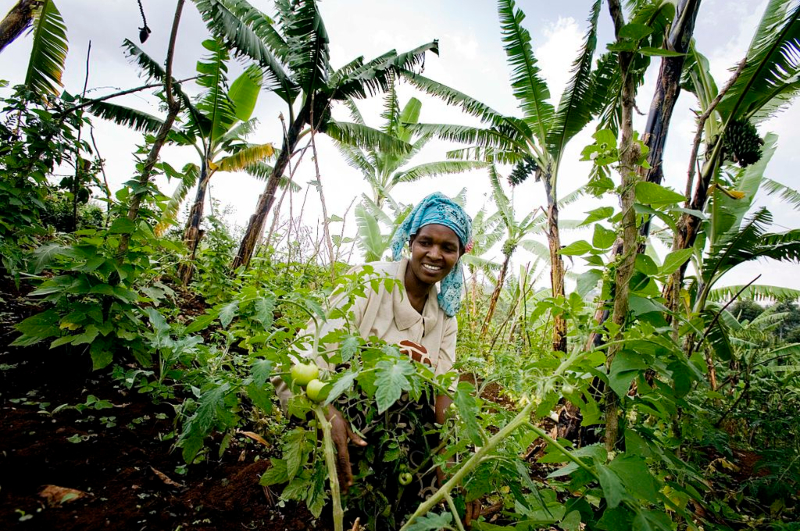

The Africa Food Systems Forum (AGRF), held from September 5th to 8th, 2023, in Dar es Salaam, Tanzania, was a groundbreaking event that brought together policymakers, farmers, scientists, and stakeholders from across the continent.
The forum under the theme “Recover, Regenerate, Act: Africa’s Solutions to Food Systems Transformation,” focused on building back better food systems and food sovereignty with youth and women at the centre.
The theme identified three steps needed to achieve this transformation: Recovery, Regenerate, and Act. Recovery calls for decisive strategies and actions to rebuild food systems after multiple crises and shocks. Regenerate emphasizes the need to regenerate natural capital resources with adaptation practices, innovation, and technology for sustainable food production in a changing climate context. Act urges urgent action to accelerate food systems transformation through better policies, practices, and investments. This forum provided a platform for robust discussions and collaborations aimed at addressing the challenges facing Africa's food systems and charting a sustainable path forward.
One of the most pressing issues discussed at the forum was food insecurity and malnutrition in Africa. Participants recognized that despite significant progress in recent years, millions of Africans still go to bed hungry every night. The forum emphasized the need for comprehensive policies and strategies to ensure access to nutritious food for all. The forum resulted in a commitment from African governments to prioritize investments in agriculture, improve infrastructure, and implement targeted nutrition programs. These policies aim to reduce food insecurity and malnutrition across the continent.
Secondly, it was noted that climate change poses a significant threat to agriculture in Africa, affecting crop yields, water availability, and overall food production. The forum emphasized the urgent need for sustainable agricultural practices and climate-resilient farming techniques. African governments and stakeholders pledged to support and promote sustainable agriculture by investing in research and development, encouraging the adoption of climate-smart farming practices, and fostering innovation in the agricultural sector. These policies aim to enhance the resilience of Africa's food systems in the face of climate change.
The forum recognized smallholder farmers as the backbone of African agriculture. However, it was noted that these smallholder farmers often face challenges such as limited access to resources, markets, and credit. The forum recognized the importance of empowering these farmers to drive agricultural transformation. The forum's policy outcomes included commitments to provide smallholder farmers with access to credit, training, and modern farming technologies. These policies aim to increase smallholder productivity and improve their livelihoods. Further, it was noted that efficient and sustainable food value chains are essential for reducing food loss and ensuring that food reaches consumers in a timely and cost-effective manner. The forum highlighted the need to strengthen food value chains across Africa. African governments and stakeholders pledged to invest in infrastructure, logistics, and transportation systems to enhance food value chains. These policies aim to reduce post-harvest losses, improve food quality, and make food more accessible and affordable.
Lastly, the forum recognized the importance of engaging Africa's youth in agriculture to secure the future of the sector. Participants discussed strategies to attract young people to farming and agribusiness opportunities. Policy outcomes from the forum included initiatives to promote youth involvement in agriculture through mentorship programs, access to land and credit, and the creation of agribusiness incubation centers. These policies aim to harness the energy and innovation of Africa's youth for agricultural development.
To conclude, the 2023 Africa Food Systems Forum in Dar es Salaam, Tanzania, marked a pivotal moment in the continent's efforts to transform its food systems. Through meaningful discussions and policy commitments, the forum addressed key challenges such as food insecurity, climate change resilience, smallholder empowerment, food value chains, and youth involvement in agriculture. These policy outcomes represent a significant step forward in shaping a sustainable and prosperous future for Africa's food systems, and they underscore the importance of continued collaboration and action by governments, stakeholders, and communities across the continent. Africa's journey towards food security and sustainability is well underway, with the 2023 forum serving as a catalyst for positive change.
Related Articles
Select Payment Method
Pay by bank transfer
If you wish to make a donation by direct bank transfer please contact Fr Paul Hamill SJ treasurer@jesuits.africa. Fr Paul will get in touch with you about the best method of transfer for you and share account details with you. Donations can be one-off gifts or of any frequency; for example, you might wish to become a regular monthly donor of small amounts; that sort of reliable income can allow for very welcome forward planning in the development of the Society’s works in Africa and Madagascar.
Often it is easier to send a donation to an office within your own country and Fr Paul can advise on how that might be done. In some countries this kind of giving can also be recognised for tax relief and the necessary receipts will be issued.

